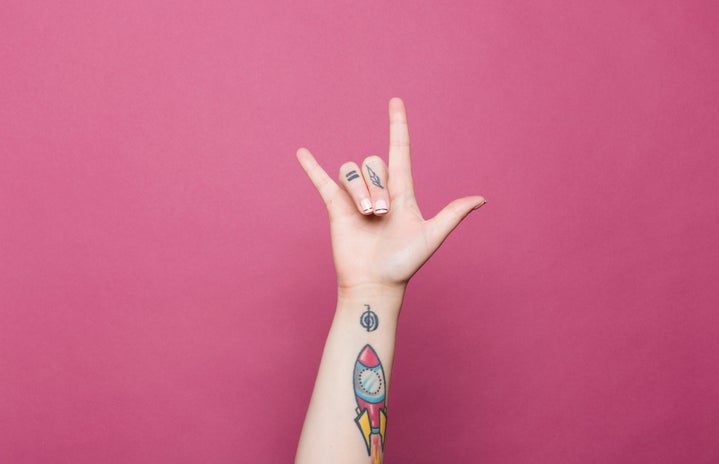Tattoos were once ubiquitous with rough and tumble biker gangs and criminals, but not anymore. Now, tattoos are all about personal expression and having something so important that you want to ink it on your skin and show it to the world. They’re becoming pretty normalized. However, though I am always up for you doing what you want – regardless of the consequences –there are still some things to consider when getting a tattoo, especially when it comes to the workplace. Tattoos are sometimes seen as unprofessional, but that could be changing.
Tattoos in the workplace
There is little research on the percentage of tattoos among Gen Zs, but the trends among Millennials generally point to an increase in getting inked. According to a 2010 report from the Pew Research center, nearly four out of every ten Millennials (those about 28-39 years old) have a tattoo. And of those who do have tattoos, most likely have more than one. In a 2016 Harris Poll, 47% of Millennials had a tattoo. This makes sense; Millennials are all about self-expression. And I think Gen Zs are expected to follow suit.
In 2010, three-quarters of Millennials had a profile on a social media site, and now ten years later, it’s odd to find a young person without one. However, because these social media sites are checked regularly by management when looking for a job, exposing tattoos is a tricky business to maneuver.
Certain employers and fields see tattoos as inappropriate in the workplace and place restrictions on their visibility and placement. For example, in office settings and upper management, professionalism policies require some type of coverage or restrictions on tattoos. In the medical professions, the tattoo policy usually depends on the hospital. At UF Shands, visible tattoos are required to be covered unless they are on the ankles or wrists; usually full sleeves are required to cover arm tattoos. Although particular industries don’t let you show your ink, companies are gradually loosening up on these rules as tattoos become more mainstream.
In a 2017 study from Merrimack College, 72% of respondents indicated that tattoos were “Appropriate/Accepted” in the workforce. This is a stark difference from once being told that getting a visible tattoo would surely mean certain unemployment. This trend is consistent in another study out of the University of Miami where Michel T. French, Ph.D. and his colleagues surveyed 2,000 people in the United States, finding that a tattoo won’t significantly impact your job prospects. In fact, men who had tattoos were 7% more likely to be employed than respondents without ink. However, there’s a big difference in having a tattoo and choosing to show it.
In the Pew Research study, 70% of Millennials that had a tattoo had it in a place that could easily be covered up. Placement is important to think about when getting a tattoo. Visibility and showing it off to express your personality are great, but sometimes it could be easier to just not show it.
Coralie Pettit, a 22-year-old third-year English major at UF, has two tattoos: one on her shoulder and one on her rib cage. When she got hired, she opted not to tell her employer about her tattoos because her uniform covered them up. She says it was just easier not to hear the protocols from her employer because she knew it wasn’t going to be a problem. If the perception of tattoos is changing, and more young people are getting them at the start of their careers, then perhaps the company policies need to keep up with the changing times. Maybe they already are.
Tattoos are all about individual expression
The other day, my roommate – who has a skull tattoo on her right arm – and I were out having dinner. The women at the cash register commented on her tattoo, stating, “Your tattoo isn’t very ladylike, but I guess it’s cool.”
My roommate, confused and irritated that she even said anything, just said, “Thanks, I guess,” and we left. Tattoos are a choice, but they are still a part of a person’s appearance; if there is nothing you can do about it then why say anything? Sometimes tattoos make wearers feel more approachable and sometimes more unapproachable. Tattoos act as an introduction; like an interesting fact easily available for any newcomer to instantly have something to share with you. In contrast, they are also something that can be easily ridiculed by those that feel their opinions need to be shared.
In a 2019 Statista poll, 82% of respondents between the ages of 18 and 29 said they agree that “tattoos are a form of art.” The decision to get a tattoo, and what the tattoo is, is a big deal and sometimes they have special meanings behind them. Pettit’s black tattoo on her collar bone is of dragons, not because they are particularly meaningful but just because she’s always liked dragons.
She got her first tattoo as a gift for her 18th birthday, and her parents had some reservations about it. Pettit says they were concerned about negative comments she might get and how future employers might see her. As a compromise, she got her first one on her rib cage where it could easily be hidden. Then, once she was older, she got the dragons on her collar bone.
On Pettit’s more visible tattoo she says, “It definitely gives me a bit of discomfort … if I’m around older people sometimes … because I just don’t want to deal with it.” She says she does often get positive comments, however among older people she mostly gets strange or disapproving looks. As aggravating and completely unfair as this is, it’s altogether unsurprising. The real question is, should we as young women care? It’s easy to say you will ignore all of the negative comments – they don’t know you or your story – but it’s just not that simple. Tattoos get a bad rep, but ultimately, they are about expression. Despite the occasional discomfort or look from a disproving stranger, Pettit says she no longer feels insecure about her tattoos. She even bought new clothes after she got her tattoos to show them off. According to the Harris Poll, 33% of inked adults say their tattoo makes them feel sexy and 32% say it makes them feel attractive. In this way, tattoos are just like anything that makes you feel cool or interesting, like a bold new hair cut or a wicked piercing.
If the culture and stigma about tattoos are changing, that’s great! But if not, that’s okay because tattoos are a deeply personal choice and one that you and only you can make. If others don’t like them, that’s okay too because they aren’t the ones that have it on their skin.
On Friday, Nov. 13th Body Tech Tattooing and Piercing will have its regular Friday the 13th special. This is your chance to can get their Friday the 13th designed tattoo for only $13 and certain piercings for a discounted price (Check out the restrictions here if you are interested). This is the perfect opportunity to get a tattoo or a piercing you’ve always wanted. College is the time to experiment, make new decisions – even if they are the wrong ones – and find out exactly what image you want to portray to the world.


